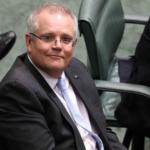Holgate’s Demonisation Was Due to Her Resistance to Privatisation, Not Watches

Continuing their get-rich-quick-and-damn-the-future approach to governance, Morrison and Co have been considering selling off Australia Post. And it appears that the PM’s shaming of former CEO Christine Holgate over Cartier watches may have actually been about her resistance to privatisation.
Early on in a 13 April hearing, Australia Post inquiry chair Senator Sarah Hanson-Young raised the double standards in the approach the government took towards Holgate, compared with the way it dealt with multiple sexual assault and harassment allegations raised against male MPs.
Following a 22 October 2020 Senate Estimates hearing that found Holgate had rewarded $12,000-worth of Cartier watches to four senior AusPost executives over having secured the lucrative Bank@Post deal, the PM called for her to “stand aside” or “go” in parliament later that day.
Juxtapose this against Morrison’s attempt to sweep the Higgins rape allegations against an ex-Liberal staffer under the carpet, his resistance to dealing with historic rape allegations levelled against Christian Porter, and his allowing serial harasser Andrew Laming to remain in parliament.
However, the inquiry also raised discussion around Holgate not having breached any company protocols, so, therefore, the whole watches saga may have been a convenient way to dispose of a chief executive who was trying to prevent a state-owned company from being dismantled.
“An asset for all Australians”
In July 2019, the Morrison government commissioned the Boston Consulting Group (BCG) to undertake a $1.3 million review of AusPost in order to assist newly appointed chair Lucio Di Bartolomeo on strategic business options, with a potential view to privatisation.
The BCG report was handed to the government in February 2020. And federal communication minister Paul Fletcher determined in July that year that the report would not be publicly released as it was the confidential business of cabinet.
“We should stop having secret reviews,” Holgate told the inquiry members this month. “Australia Post is an asset for all Australians.” And in using the privilege afforded to her by the inquiry, she revealed some of the details that the unreleased document contains.
BCG recommended the closure of 190 suburban post offices, with up to 8,000 jobs lost, as well as a huge reduction in services. Holgate added that while it would be difficult for government to close down private licensee outlets, a reduction in services offered would run them into the ground.
Holgate pointed to the partial privatisation of the UK’s postal business, which saw parcel delivery handed over to private interests, leaving public post offices to go bankrupt. And she underscored that AusPost is a lifeline for those living in rural and regional Australia.
The then CEO’s opposition to the report put her offside with the communications minister, Holgate claims. “The simple truth is: I was bullied out of my job,” she said. “I was thrown under the bus so that the chairman of Australia Post could curry favour with his political masters.”
The watch scandal
Under Holgate, AusPost brokered the Bank@Post agreement in 2018, which sees the Commonwealth Bank (CBA), Westpac and NAB provide additional funding and pay higher fees, so their customers can do their banking transactions at the post office.
Bank@Post is of particular value in regional and rural areas where many banks have closed down their branches. And, according to Holgate, it brought in $220 million that saved “post offices and raised $22 million in GST”.
During a Senate Estimates hearing last October, it came to light that following the CBA coming on board in October 2018, Holgate went on to reward four AusPost executives each with a $3,000 Cartier watch. And later that day the PM was calling for her to stand down or resign in parliament.
At last week’s hearing, however, Holgate made clear that it was well within her authority to reward her staff in this manner. Indeed, if she had chosen to, she could have instead provided the four with bonuses of up to $150,000 each.
“They were signed off by the CFO at the time. Fringe benefit tax was in there. They were audited,” Holgate said. “There was never any question whatsoever, from anybody, that they were in any way in breach of any policy.”
The former AusPost boss added that she’s fairly certain that minister Fletcher knew about the Cartier watches back when they were given to the executives.
Embellishing the truth
Treasurer Josh Frydenberg stated last Thursday that AusPost is not about to be privatised, but in terms of internal matters to do with the service, he said he’d leave that up to the relevant minister to deal with.
A key BCG report recommendation was the “full or partial divestiture of the parcels business”.
AusPost reported in February that the first half of the financial year saw a 15.5 percent revenue increase, which is in part due to “the strongest parcel volumes in the organisation’s history”.
Holgate claims that she never officially resigned from her position as chief executive, as while she made the offer to do so in an email, she didn’t actually take the step. But AusPost went on to announce that she had resigned, and chair Di Bartolomeo then confirmed this in the Senate.
Holgate has described her overall treatment during the watch scandal as akin to being “run over by a bus and then reversed over again”.
And while it was the PM who initially stated in parliament that the AusPost “chief executive has been instructed to stand aside and, if she doesn’t wish to do that, she can go”, he was before the press on 7 April, stating, “Ms Holgate decided to leave Australia Post. That’s just a matter of record.”
This public denial that he ever instigated the standing down or sacking of Holgate, yet again, reveals the leader of the nation ducking and weaving from issues in a way that portrays a politician, who plays the game of politics in an effort to see what he can get away with, despite it affecting real lives.
Yet, as we have seen from the master of such politicking, former US president Donald Trump, constantly treating members of the constituency like they can be easily duped is a technique that promptly falls over.







